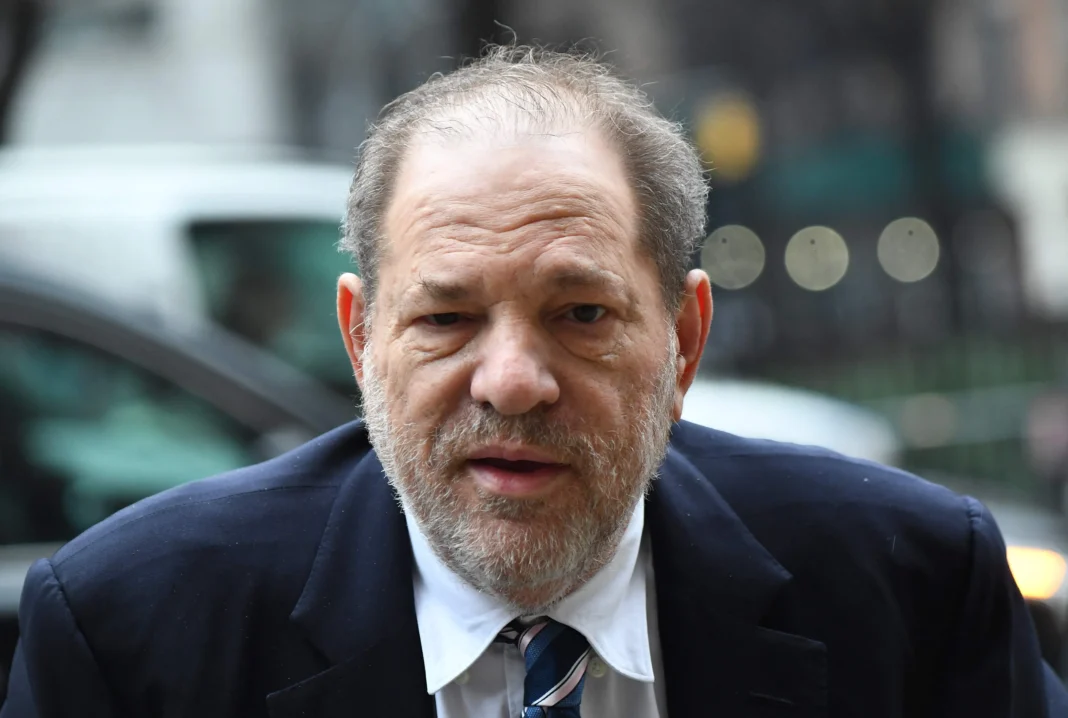The New York State Court of Appeals overturned the 2020 rape conviction of Harvey Weinstein, signaling a significant turn in events for the former Hollywood mogul and the #MeToo movement.
This action mandates a new trial based on findings that the trial judge’s rulings, including the admittance of testimonies from women about uncharged allegations, were improper. Despite this development, Weinstein will continue to serve time for another rape conviction in Los Angeles, highlighting the complexity of accountability in cases of sexual assault and violence within the film industry.
This ruling not only brings Harvey Weinstein back into the legal spotlight but also impacts the broader conversation on sexual harassment in Hollywood, raising questions about what happened to Harvey Weinstein and the ongoing struggle for justice by his accusers and supporters of the #MeToo movement.
It underscores the legal challenges faced in prosecuting sexual violence, while the Manhattan District Attorney’s office’s commitment to retrying Weinstein demonstrates a continued effort to hold him accountable. This case, reminiscent of the setbacks faced in the Bill Cosby sexual assault conviction appeal, stresses the turbulence and resilience within the #MeToo movement’s crusade against sexual misconduct.
Background of the 2020 Harvey Weinstein Conviction: Who is Harvey Weinstein?
Harvey Weinstein timeline
Harvey Weinstein, a former Hollywood mogul, faced significant legal repercussions that culminated in his 2020 conviction. Here is a detailed overview of the charges and the convictions that brought him to justice:
Convictions and Sentences
- Initial Charges and Conviction:
- Convicted in February 2020 for a criminal sex act in the first degree and rape in the third degree, stemming from incidents in 2006 and 2013.
- Sentenced to 23 years in a New York prison.
- Additional Convictions:
- In 2022, Weinstein was also convicted of sex offenses in Los Angeles and received a 16-year prison sentence.
The Allegations and Impact on #MeToo
- The charges against Weinstein were first brought to public attention by The New York Times and The New Yorker in 2017, exposing his pattern of sexual abuse.
- This exposure played a pivotal role in fueling the #MeToo Movement, highlighting widespread issues of sexual misconduct and lack of accountability in various industries.
Details of Specific Cases
- 2006 Incident: Convicted of forcibly performing oral sex on Mimi Haleyi, a TV and film production assistant, at his apartment.
- 2013 Incident: Convicted of rape in the third degree involving Jessica Mann, an aspiring actress, at a hotel.
Current Status
- As of the latest updates, Weinstein has been serving his sentences in both New York and California, reflecting the ongoing legal consequences of his actions.
This section provides a comprehensive overview of Harvey Weinstein’s legal battles and the broader societal implications tied to his convictions.
The Appeals Court Decision
Key Points of the Appeals Court Decision
- Errors in Trial Procedures:
- The New York Court of Appeals identified significant procedural errors during the trial, notably the admission of testimony regarding uncharged sexual acts. This was seen as prejudicial against Weinstein and led to the overturning of his conviction.
- Impact of Testimonies:
- The court criticized the trial judge for allowing testimonies from four women whose allegations were not directly linked to the charges. This inclusion was deemed an abuse of judicial discretion and significantly influenced the decision for a retrial.
- Outcome of the Decision:
- Despite the overturned conviction, Weinstein will not be released from prison. He remains in custody due to a separate 16-year sentence for rape in Los Angeles. The decision mandates his transfer to California authorities.
- Future Legal Proceedings:
- A new trial in New York has been ordered, reflecting the appeals court’s decision. This does not affect his ongoing legal battles in California, where he faces additional charges.
- Reaction from Legal Teams:
- Weinstein’s defense hailed the decision as a victory for due process, while the Manhattan District Attorney’s office expressed intentions to appeal the decision and retry the case.
- Broader Legal Implications:
- The decision has sparked widespread debate about the handling of sexual assault cases in the legal system, emphasizing the need for judicial reform and fair trial standards.
Impact on the #MeToo Movement
Responses and Reflections
- Continued Advocacy:
- Even with the overturned conviction, Katherine Kendall remains a staunch supporter of the #MeToo movement, emphasizing its importance in advocating for survivors’ rights.
- Anita Hill and the Hollywood Commission express concerns over the slow progress in correcting power imbalances that perpetuate abuse.
- Systemic Change Needed:
- Anita Hill highlights the necessity for institutional reforms to better support survivors and ensure accountability, reinforcing the movement’s commitment to systemic change.
- Movement’s Influence:
- The #MeToo movement has significantly influenced cultural and social dynamics, making it easier for survivors to come forward and share their experiences.
- It has also contributed to changing attitudes towards sexual harassment and assault, fostering a safer, more equitable environment.
- Global Impact:
- The movement’s reach has been global, with women from various industries coming forward to disclose their experiences, highlighting the widespread nature of the issue.
- Legal and Cultural Setbacks:
- The decision to overturn Weinstein’s conviction is seen as a legal setback, rooted in procedural technicalities rather than a negation of the accusations against him.
- This has sparked a broader discussion and debate about the effectiveness of the legal system in handling cases of sexual assault.
Ongoing Challenges and Commitment
- Disappointment and Resilience:
- The overturning has been a source of disappointment for many of Weinstein’s accusers and supporters, yet it has also galvanized further support for the movement.
- This incident underscores the ongoing challenges faced in the pursuit of justice and the critical need for continued advocacy and support for survivors.
Response from Harvey Weinstein’s Accusers
Accuser Reactions and Legal Stance
- Immediate Responses from the Weinstein Accusers:
- Jessica Barth labeled the appeals court’s decision as a “tragic step backwards” for sexual assault cases, fearing the precedent it could set.
- Caitlin Dulany expressed optimism despite the setback, believing that “survivors will win in the end“.
- Louise Godbold was vocal about her shock and outrage, reflecting the emotional impact on Weinstein’s accusers.
- Legal Readiness:
- Tarale Wulff and Dawn Dunning, who testified in the 2020 trial, alongside their representative Douglas H. Wigdor, face the possibility of re-testifying, highlighting ongoing legal battles.
- Evgeniya Chernyshova’s attorney, David Ring, remains confident that despite the overturned conviction, her case’s verdict will endure.
- Organizational and Group Statements:
- The Silence Breakers described the ruling as “profoundly unjust” but acknowledged it as just a hurdle, not the end of their fight.
- RAINN condemned the decision sharply, urging for a swift retrial by District Attorney Bragg to uphold justice for the survivors.
- Future Legal Proceedings:
- The Manhattan District Attorney’s office has signaled intentions to retry Weinstein, potentially requiring accusers to revisit their traumatic experiences in court.
- Discussions about the impact of this decision on future sexual assault cases are ongoing, with many viewing it as a critical moment for legal precedents.
Legal Perspectives and Future Implications
Legal Perspectives and Future Implications
- Credibility and Evidence Challenges:
- The overturned conviction of Harvey Weinstein has sparked discussions on the credibility of witness testimony and the application of evidence in sexual assault cases, raising concerns about the consistency and reliability of legal procedures in such sensitive matters.
- Setting Legal Precedents:
- Legal experts anticipate that this case will establish significant precedents for future sexual assault trials, particularly concerning the management and admissibility of evidence. This could potentially reshape the landscape of criminal justice in cases involving sexual crimes.
- Continuing Charges in Los Angeles:
- Despite the overturned conviction in New York, Weinstein continues to face charges in Los Angeles. These charges, if leading to convictions, could result in additional prison time for Weinstein, highlighting the ongoing legal repercussions he faces.
- Health Concerns and Legal Strategy:
- Harvey Weinstein’s health issues, including diabetes, eye problems, and heart conditions, have been part of his legal narrative, affecting his imprisonment conditions and possibly his legal strategy moving forward.
- Appeal in California:
- Scheduled for May 20, Weinstein’s appeal against his California conviction could further influence the legal outcomes and public perceptions related to his cases.
- Challenges in the Legal System:
- The ruling has underscored the difficulties the legal system faces in providing justice to victims of sex crimes, reflecting broader issues of legal adequacy and the need for systemic reforms to better serve victims.
The overturning of Harvey Weinstein’s 2020 rape conviction presents a complex landscape of accountability, justice, and the tangible impacts of the #MeToo movement within the legal and societal realms.
This development not only reignites the conversation about the challenges of prosecuting sexual violence but also underscores the resilience of survivors and advocates striving for change in the Hollywood industry and beyond. The path forward, demanding both legal scrutiny and cultural introspection, reaffirms the necessity of institutional reforms and continued advocacy to address and correct power imbalances that enable such abuses.
As this case prompts a new trial and further legal proceedings, it stands as a critical reminder of the ongoing struggles faced by survivors of sexual assault in their quest for justice. It highlights the broader implications of high-profile legal outcomes on the pursuit of accountability, while also emphasizing the importance of a fair and balanced judicial process.
This moment serves as a catalyst for further discussion, action, and research into improving the legal system’s approach to sexual assault cases and reinforcing the impact of movements like #MeToo in advocating for survivors and fostering a cultural shift towards zero tolerance for sexual misconduct.




